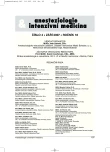-
Medical journals
- Career
Non-heart-beating donors
Authors: M. Gerlichová 1; V. Černý 1; P. Navrátil 2; K. Baker 2
Authors‘ workplace: Klinika anesteziologie, resuscitace a intenzívní medicíny, Univerzita Karlova v Praze, LF v Hradci Králové a Fakultní nemocnice Hradec Králové 1; Transplantační centrum, Urologická klinika Fakultní nemocnice Hradec Králové, Univerzita Karlova v Praze LF v Hradci Králové 2
Published in: Anest. intenziv. Med., 18, 2007, č. 4, s. 236-240
Category: Intenzive Care Medicine - Comprehensive Report
Overview
Since the 1990s the continuous quest for new organ resources for transplantation has re-evoked the interest in non-heart-beating donors (NHBD). The method was pioneered in the Netherlands and nowadays NHBDs are accepted in a wide range of countries. Since 2002 the Czech Republic has joined these countries in accepting this group of donors. The basic medical problem related to NHBD is the duration of the warm ischaemic time and the ischaemic-reperfusion syndrome. NHBDs remain a very specific group even from the ethical and legal aspects. Legislation of individual countries varies as much as the protocols of the individual transplantation centres. The Transplantation Centre of The University Hospital Hradec Králové began accepting organs from NHBDs in compliance with the Czech Transplantation Act 285/2002. The methods of termination of resuscitation and follow-up care of NHBDs are regulated by guidelines that were created as a result of the co-operation between The Transplantation Centre Hradec Králové and the Department of anaesthesia, resuscitation and intensive medicine at the University Hospital Hradec Králové. The most common organs donated from NHBDs are the kidneys followed by the liver, pancreas and lungs. Published studies agree on reporting a delayed return of renal function whereas long-term grafts survival varies by centre. In spite of this NHBD remains promising in the field of transplantation in the Czech Republic and worldwide.
Key words:
transplantation – non-heart-beating donors – Maastricht categorization – warm ischaemic time – explicit and presumed consent – no-touch interval – graft outcome after NHBD retrieval
Labels
Anaesthesiology, Resuscitation and Inten Intensive Care Medicine
Article was published inAnaesthesiology and Intensive Care Medicine

2007 Issue 4-
All articles in this issue
- Anaesthesia options in carotid endarterectomy
- Influence of low dose ketamine on anaesthesia for bronchoscopic procedures
- Single-shot paravertebral block in children – the initial experience
- Notes on the pathophysiology of postoperative delirium
- One-year experience with the Centralized Intensive Care Unit of the Department of Anaesthesiology and Intensive Care Medicine in Brno
- Non-invasive optical methods for microcirculatory assessment in experiment and in clinical practice: Orthogonal polarization spectral (OPS) imaging and Sidestream dark-field (SDF) imaging
- Non-heart-beating donors
- The First Registered Anaesthetic Nurse in Czechoslovakia: D. S. Alena Stárková-Palečková
- The early days of ether anaesthesia in Moravia in February 1847
- History of anaesthesiology and intensive care in the University Children’s Hospital in BrnoČerné Pole
- Anaesthesiology and Intensive Care Medicine
- Journal archive
- Current issue
- Online only
- About the journal
Most read in this issue- Non-heart-beating donors
- The First Registered Anaesthetic Nurse in Czechoslovakia: D. S. Alena Stárková-Palečková
- Notes on the pathophysiology of postoperative delirium
- The early days of ether anaesthesia in Moravia in February 1847
Login#ADS_BOTTOM_SCRIPTS#Forgotten passwordEnter the email address that you registered with. We will send you instructions on how to set a new password.
- Career

